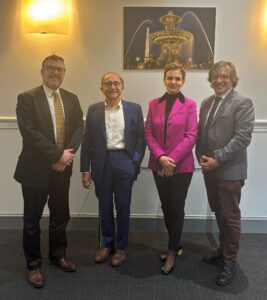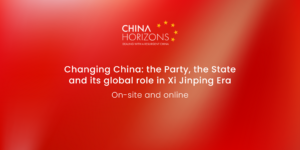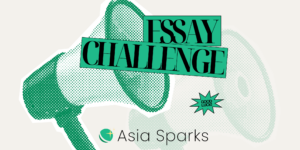Asia Centre welcomed the Shanghai Academy of Social Sciences (SASS) in Paris, November the 8th 2024.
The parties exchanged in-depth and substantive views on various subjects related to international relations, especially concerning bilateral relations between Europe, the EU member-states and the People’s Republic of China, trade and investments, and the war in Ukraine among others.
Foreword Notes:
The parties agreed to meet under the framework of Asia Centre’s Code of Conduct for Open Dialogue, whereby both parties are encouraged to publish their respective statements after the meeting. The below “statements” from Asia Centre list the most important topics that were discussed, and provide context and understanding on each of these topics at the time of the meeting.
Asia Centre strives to share its opinions and work openly with visiting delegations.
Attendees:
SASS:
- Dr Wang Jian, Director, Institute of International Relations, SASS
- Dr Dai Yichen, Deputy Executive Director, Branch of European Research, Institute of International Relations, SASS
- Mr Zhang Guoyun, Council Member of Shanghai Academy of Social Sciences Think Tank Foundation, Director of the Office of Finance and Accounting of SASS
- Dr Li Min, Assistant Professor, Institute of International Relations, SASS
Asia Centre:
- Mrs Isabelle Feng, Business law and corporate governance, China, Scientific Associate at Université Libre de Bruxelles, Researcher at Asia Centre
- Mr François Issard, Energy and Climate, Researcher at Asia Centre
- Dr Arnaud Leveau, Security and Public Affairs, Associate Prof. at Paris Dauphine University, Researcher at Asia Centre
- Mrs Emmanuelle Foulon, Legal expert, China, Asia Centre
- Ms Méline Rousseau, Apprentice, Asia Centre
Asia Centre’s statements regarding the November 8, 2024 meeting:
Several matters were reviewed during the exchange as follows:
China-US relations: Despite some declaration of good intentions emanating from the Chinese government, SASS stated that the results of the recent US elections will likely strongly affect bilateral relations, particularly economically with a negative impact anticipated on China’s GDP.
Business and consumer confidence: Asia Centre raised concerns about the momentum of the domestic market in China. Recent stimulus dedicated to the stock exchange and real estate markets tend to address cyclical problems, rather than the structural challenges that domestic and international investors face in China. Responding to the delegation flagging the continued intent and actions for further opening up of the Chinese economy, Asia Centre highlighted many persistent challenges ranging from the rapid weakening of the market to increasing regulatory challenges like inconsistent enforcement, opaque rules, and unequal treatment.
War in Ukraine: While this subject was not at the top of the delegation’s agenda, as a European think tank, Asia Centre brought it up and expressed strong regrets and concerns about China’s “no limits” policy with Russia, and the support provided to the invasion, including the targeting of civilians and public infrastructures.
Asia Centre raised the concern of North Korean troops recently entering the conflict, representing the first time an Asian conflict is finding a path within a European war theatre. Asia Centre’s perception is that China remains subdued on this issue while Europeans expect it to use its influence as a mitigator. The SASS confirmed that China was sticking to the UN Charter and raised that, while being disappointed by North Korea’s media giving more importance to the partnership with Russia (as compared with the partnership with China), China is well aware that their exportations to North Korea are vital for its survival, and for maintaining stability in the region. SASS confirmed China’s clear objection to having the conflict expand beyond the current theatre. The SASS also believes that Russia is finding itself isolated, otherwise it would not look for help from North Korea.
A two-security axis / IndoPacific: Asia Centre pointed out US’s pressure on their Asian partners’ defense budget. The US is pushing South Korea and Japan to strengthen their defense industry while Japan’s discourse is using a new wording, based on the idea of an “Asian NATO”. Responding to Asia Centre about China’s reaction to such a dual axis the SASS made the remark that the US is putting pressure on their Asian allies in order to raise their military expenditures of American weapons. However, they commented that China’s view is that those Asian allies’ first priority is their economic growth. The SASS also shared that Chinese scholars believe the US will continue to put more attention on the Indo-Pacific area and to establish or strengthen multilateral alliances such as the QUAD in order to balance / contain China and that will ultimately result in the US decreasing attention on Europe’s situation. They also stressed how heterogeneous Europe is on military-strategic issues. In SASS’ view, the existing trans-Pacific alliances will experience a shift because of the Indo-Pacific.
Trade between EU and China: Both the SASS and Asia Centre view the Russian invasion of UKR as creating negative sentiments vis-à-vis China, which impacts relations on all fronts, diplomatic and multilateral, trade, travel and even cultural exchanges. In this context, commercial disputes such as EV subsidies (denied by SASS) are more complicated to resolve and bilateral relations are not as effective as they could be.
France-China: Worried about the relatively conflicting stance of the EU towards China, SASS expressed concerns about the future role of France as a rather balance of power in defining relations of the EU with the rest of the world and China particularly. Beijing understands the status of France and views its bilateral relation from a strategic perspective.
People and Academic Exchanges: Finally, Asia Centre expressed regrets that researchers located in China are unable to access highly needed international information, as controls and access restrictions are currently blocking them from viewing our website, www.asiacentre.eu. We respectfully request that all Chinese researchers be allowed access to our website, so they can benefit from the same information that is available to those who visit Asia Centre in person.
The SASS expressed its satisfaction with the current context of fruitful and open discussions and its desire to continue the exchange with Asia Centre on a wide range of academic themes and as a follow-up, extended an invitation to do so in Shanghai in 2025.




